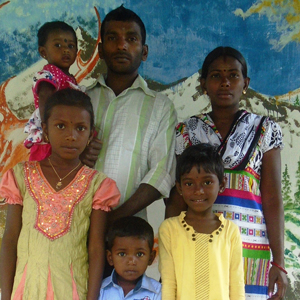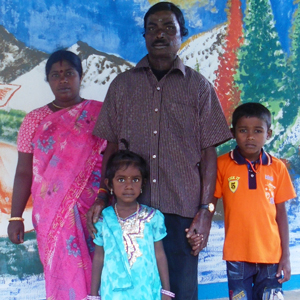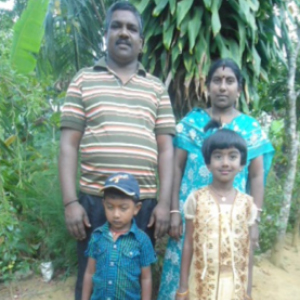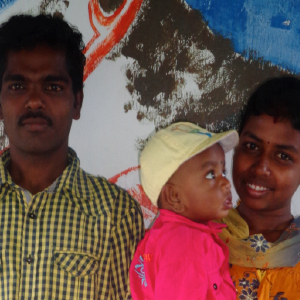Ramesh’s Story | Sivakumar’s Story | Mr. Pushparajan’s Story | Sathiskumar’s Story
Stories from Ambagamuwa Area Development Program
World Vision Lanka’s Ambagamuwa Area Development Program (ADP) has been carrying out MenCare programming since 2012, improving the lives of children and families in the Sri Lankan plantation community. This month, the Ambagamuwa ADP shared stories from three fathers who participated in the program.
Ramesh’s Story
 Ramesh, a 30-year-old father of four, married estate worker Nirmala Devi at 22 years old. After the marriage, Ramesh traveled to Colombo – 150 kilometers away from his home – in search of employment. Due to distance and the constraints of his new job, Ramesh was unable to return home regularly. He began to drink a lot with friends and visit his family even less frequently. When he did come home, he often became violent toward his wife and disregarded his children and their academic needs.
Ramesh, a 30-year-old father of four, married estate worker Nirmala Devi at 22 years old. After the marriage, Ramesh traveled to Colombo – 150 kilometers away from his home – in search of employment. Due to distance and the constraints of his new job, Ramesh was unable to return home regularly. He began to drink a lot with friends and visit his family even less frequently. When he did come home, he often became violent toward his wife and disregarded his children and their academic needs.
In 2013, Ramesh joined a MenCare fathers’ group conducted by the Ambagamuwa ADP. He participated in the program for about six months, and through the groups, he began to realize the importance of becoming more involved in the lives of his wife and children in equitable and nonviolent ways.
Nirmala Devi said that her husband’s new commitment to nonviolence and participation at home helped the entire family:
“We had many problems in our family. They all changed as my husband started to attend MenCare classes,” Nirmala Devi says. “First of all, he gave up his job in Colombo and found a job in the estate. He stopped complaining and quarrelling with me over my shortcomings. Instead of that, he came forward to help me with the domestic work like cooking, washing clothes, and taking care of children. His presence at home brought joy and happiness to my family. My children were very happy to have him at home.”
Ramesh also recognizes that his change made him a better father, improved his relationship with his wife, and increased his own happiness.
“I stopped consuming liquor, except at the times of parties or weddings,” Ramesh says. “Before, I used to spend a lot of money on alcohol. But now I can spend it to fulfill the needs of the children.
“I can now understand the problems my spouse goes through. Earlier, I only complained and fought with her, as I felt she was the culprit for all the problems. But now I help her to look after children and do the domestic work. We solve our family problems together. I feel the lessons I learned in the MenCare program were very important for me. I was not a good father before. But now I feel I am a good father. I love my family a lot.”
Sivakumar’s Story
 Sivakumar is an estate worker who married at age 24. After one year of marriage, he was badly burned in an accident that left his face permanently scarred. Unable to cope with the trauma of the accident and his physical disfiguration, Sivakumar began to binge drink and to use verbal and physical violence against his wife, who left the abusive relationship.
Sivakumar is an estate worker who married at age 24. After one year of marriage, he was badly burned in an accident that left his face permanently scarred. Unable to cope with the trauma of the accident and his physical disfiguration, Sivakumar began to binge drink and to use verbal and physical violence against his wife, who left the abusive relationship.
Sivakumar remarried after five years, and he began to use violence against his second wife Sakunthala. Sakunthala remained with Sivakumar, despite the insistence of her parents that she return home.
Meanwhile, Sivakumar had the opportunity to join a MenCare fathers’ group conducted by the Ambagamuwa ADP. In the groups, he learned about the importance of active participation in childcare; equitable distribution of household responsibilities; promotion of gender equality within the family and the community; healthy and nonviolent relationships; sexual and reproductive health and rights; moderating alcohol consumption; and social responsibility. The experience led him to transform his attitudes and behaviors:
“It is only after attending the MenCare program that I understood that my life had to change. I didn’t care for my wife and the child before,” Sivakumar said. “I didn’t think of the future of my child.”
“But I now help my wife,” he explained. “I take care of my daughter while she works in the estate. I am also able to save money for the future of my child. I have opened a bank account and I deposit some money monthly for her.”
Sakunthala also attests to her husband’s change:
“On the days my husband used to get paid, he would come home drunk,” she said. “But now when we get the salary, we both go to the city to buy what we need for the rest of the days. We give our daughter what she needs. My husband does household work in my absence and takes care of her. I am very happy about his change of behavior. My only hope is to give a good education for my child.”
Mr. Pushparajan’s Story
 Mr. Pushparajan has been married to Parameswary for six years. The couple has two children – a six-year-old girl and a three-year-old boy. Mr. Pushparajan works as a tailor and his wife supports their business, which is run out of their home.
Mr. Pushparajan has been married to Parameswary for six years. The couple has two children – a six-year-old girl and a three-year-old boy. Mr. Pushparajan works as a tailor and his wife supports their business, which is run out of their home.
Before Mr. Pushparajan joined the MenCare program two years ago, he used to drink and smoke excessively. He used violence against Parameswary and their children when they disagreed with him. He did not participate in feeding the children or helping them with their homework, and he believed it was his wife’s responsibility to cook, carry out household chores, and take care of the children.
The MenCare program led to a transformation in Mr. Pushparajan’s attitudes and behaviors toward his family. He learned the importance of nonviolence in his relationship with his wife and children, and he adopted positive, violence-free communication strategies to resolve conflicts. In addition to sharing household decision-making, childcare, and domestic responsibilities with Parameswary, Mr. Pushparajan also learned to share financial decision-making with his wife, and together they reduced unnecessary expenditures and increased savings.
Through these changes, Mr. Pushparajan has found happiness and satisfaction with his family at home, improved his relationship with his friends and neighbors, and become a positive role model for others in the community to follow. Indeed, the majority of the other fathers in Mr. Pushparajan’s MenCare group have made similar changes, he says, indicating the success of the program.
Stories from Nuwara Eliya Area Development Program
World Vision Lanka’s Nuwara Eliya Area Development Program (ADP) has been carrying out MenCare programming since January 2015, working with men and their families in the Sri Lankan plantation community to promote gender equality and family wellbeing. In September, the Nuwara Eliya ADP shared the story of a father who participated in the program.
Sathiskumar’s Story
 Sathiskumar, who is 29 years old, has a nine-month-old son with his wife Sathyavani. Through MenCare programming in the Nuwara Eliya ADP, Sathiskumar learned the importance of sharing the care work and saving for his child’s future.
Sathiskumar, who is 29 years old, has a nine-month-old son with his wife Sathyavani. Through MenCare programming in the Nuwara Eliya ADP, Sathiskumar learned the importance of sharing the care work and saving for his child’s future.
“I used to spend ₨ 600 [US$ 4.60] at a time to consume alcohol when I had money in hand,” Sathiskumar said. “After participating in the fatherhood sessions, I realized that it was bad for my family life. Now, I have reduced my alcohol consumption and will stop completely very soon. I was able to increase savings for my child from ₨ 200 to ₨ 400 per month.”
“We used to quarrel when we disagreed on certain matters,” Sathiskumar continued. “Now we don’t, and we talk if there is any issue. I take care of my child when my wife engages in other work at home. We both work in the tea plantation as laborers. I used to expect my wife to come home from the field and prepare lunch for me. But now I prepare lunch without waiting for her to come and cook.”